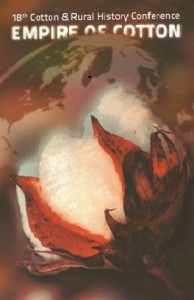
The Cotton & Rural History Conference is presented annually at the Audie Murphy/American Cotton Museum
Last month I had the honor of judging the Regional contest for National History Day, a group I consider important in the development of future leaders in our country. The National History Day website states that “National History Day makes history come alive for students by engaging them in the discovery of the historical, cultural and social experiences of the past.”
Students from grades six through twelve are encouraged to enter the contest by writing papers, creating websites or exhibits, presenting original performances or filming new documentaries on a broad topic. This year’s students are studying Rights and Responsibilities in History. They choose a topic that supports the theme; this year Jackie Robinson was well represented.
Once the topic is chosen, the student or team of up to five students research, analyze and interpret the research, and draw conclusions about the significance of their topic. Topics chosen in the Middle School division contest at Texas A&M Commerce included a comparison of rights in East and West Germany when the Berlin Wall came down, and a comparison of strategies in the United States and Great Britain in the struggle for women’s right to vote. One group of girls tackled John Locke. The teams of judges are all professional historians. We were amazed at their choice. Other topics included Japanese Internment during World War II, and the Dred Scott Case in Missouri. All the exhibits were well done, and focused on the theme. Each individual or team must talk to the judges about the project. I imagine that is one of the hardest parts, but the students I have met over the years are usually very poised and articulate.
Research and analytical skills acquired during National History Day contests are skills that carry over into business, law, medicine and numerous other disciplines. Former contestants put these skills into practice throughout life, as do others who participate in activities such as Destination Imagination.

Sven Beckert of Harvard University and author of Empire of Cotton: The Global Origins of Modern Capitalism
Another interesting local event is the Cotton & Rural History Conference presented at the Audie Murphy/American Cotton Museum for eighteen years. Two graduate history students, usually PhD. candidates, present papers followed by a panel of local residents Eyewitness History. This year Carol Allen of Cumby recalled childhood on a cotton farm. Charles Shirey of Greenville spoke about the end process of cotton, the manufacture of clothing from cotton cloth using cotton thread and the difficulty of finding suppliers during and just after World War II.
Sven Beckert of Harvard University and author of Empire of Cotton: The Global Origins of Modern Capitalism delivered the Keynote Presentation. Since many men in Greenville during the period between 1890 and 1915 considered themselves capitalists, the program definitely had local ties.
